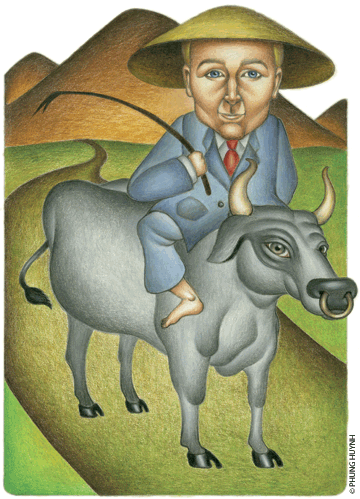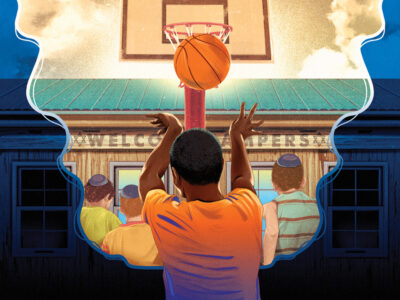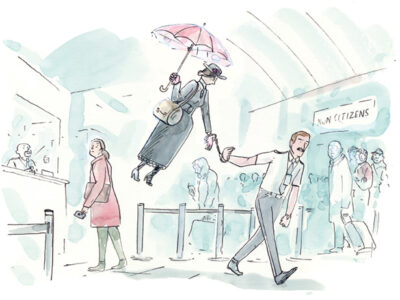
Did he graduate from the Wharton School?
By Ken Klein | We all know the image: A small herd of powerful, neck-skin-drooping oxen crossing a dirt road, returning from grazing. They lumber with confident disdain through a timeless landscape, followed by a small man in a straw hat who carries a switch. The huge beasts are so entrancing that we seldom consider the man, what sort of life he might lead, his hopes and dreams. He appears insignificant in comparison and does not invite the question, Did he graduate from the Wharton School?
I can remember back to freshman orientation weekend. We were presented with a list of occupations ranked according to earning potential. Doctor and lawyer were certainly near the top, though I recall being more intrigued by the lower echelon jobs, which closed out with fisherman.
Bangkok is the capital city of Thailand. The official population is about five million—though the actual figure might be as high as three times that number. The discrepancy is created because people move into the city to work, but are always considered to be from their home district. This is the importance of your village; the birthplace of your ancestors will forever be your home.
My wife, Nalumon—whom I met through a mutual friend while visiting Thailand—is the oldest of four daughters in a family of hard-working, land-owning subsistence farmers. They own non-contiguous plots of land with fruit trees, rice paddies, and a field of corn, as well as a small plot of land occupied by the family gathering place. Nalumon’s father hopes that one day they will acquire a large enough plot of ground to create a family compound within which each of his daughters and their husbands can build homes, but land in the village is hard to find or buy.
In one of our early meetings, my future father-in-law confided the family-compound concept to me, though at the time he had more pressing issues on his mind. A failed fruit crop had left him with a $500 debt that was accruing interest at a locally accepted rate of five percent per month. Though rice and vegetables are plentiful and there is little want for food, currency is a scarce commodity. He was having trouble sleeping and could think of nothing but the weight of his debt.
A week later, when we were alone, I quietly handed him the cash to overcome the obstacle.
When I first met this gentle man, short of stature but with the physique of a middleweight, there was a brief moment of uncertainty for him. After our introduction, he had asked about my work. Any father’s rightful question for sure, but the answer was beyond my language capabilities at the time and somewhere past easy understanding. Stock markets, investments, real estate, bonds, and early retirement after years of being a businessman in Pennsylvania (importing handcrafts, jewelry, and sweaters, and printing T-shirts) were probably not comprehensible for a subsistence farmer, I thought. After a long pause, I answered that I was not currently working.
A puzzled look drifted across his face. “How do you eat?” he asked.
The apparent ease with which his debt had been repaid brought other dreams to light by my next visit. Upon my return, the tending of oxen was explained and a partnership offered. Surely an investment of $3,500 was not too much to ask. Though I admired the skill with which the deal was presented, my concerns about being seen as the banker for the family that was not yet my own led me to decline.
A couple of years later, after marriage made me a full member of the family, I set to work on the project of acquiring land in the village for a family compound.
The search led me to Khun Sak, a 62-year-old, recently retired government official. A dynamo of a man, tall and broad-shouldered, neat and polite, he was engaged in several businesses: He had built a granite-mining concern as well as a roadside convenience store/gas station complex along the main highway and he was in the process of constructing a resort. Sak was chauffeured around in a spanking new SUV equipped with everything but a stewardess. Having purchased a large parcel of mountain land, he was currently clearing the property and selling it off in lots.
Friends in Bangkok, Thai and foreigners alike, freely offered advice on purchasing land. Above all, you must have a deed, they said. Upcountry—defined as everything outside of Bangkok—was rife with land disputes. Don’t be fooled by the fact that people call him Bpee (older brother), they said. Everyone is Bpee. This I knew. You could meet someone once, and if the meeting was warm, they could be Bpee.
Sitting together after dinner on the polished teak floor of the family home, we engaged in an informal family-circle meeting about buying into Khun Sak’s development. I asked if I could speak freely. I did not want to speak badly of Sak, who was well-respected, I said, but I had questions. There was too much that did not add up. Most important, there was no deed, but rather a story of how we would get a contract and the deed would follow in six years. Even without my Bangkok friends’ warnings, I had been in business long enough to know that a story is no substitute for a deed.
“What could go wrong?” the family asked me.
“Khun Sak could die,” I offered. Six years is a long time.
But there seemed more right than wrong, and despite my premonition of problems, my desire to assist in the family project won out. After we signed the contract and paid a 50 percent deposit, my father put me on the back of his motorcycle and we went out to the land.
Thai is a language of the heart. There are probably a hundred common expressions in conjunction with the word heart. Most beautiful is Kao jai—to understand. The literal translation is “to enter the heart,” as true understanding must take that route.
“Por jai?” he asked me. (Literally: “Is your heart satisfied?”)
“Are you satisfied?” I returned the question. His smile lit the surrounding mountains.
One year later, Bpee Sak was dead. It appeared that the unwritten guarantee to bring water and electricity to the property we had bought might not be upheld. His daughter, who had been left in charge of the empire that he built, did not share his government connections.
It could have been worse, however. When confronted by my nervous father-in-law, she offered to return the money in full. I was in America at the time, and when I next called up to the village, the money was safely resting in the local bank.
As one dream may be forced into temporary remission, there are always others to take their place. The returned deposit for the land was $3,500, which, coincidentally, was the same sum requested years ago to begin our partnership in the business of oxen.
Thinking back to Penn’s orientation weekend, I wonder if my destiny was oddly predetermined. Though I am not a fisherman, I can be an ox herder, lounging by the side of the road, reading a book under a tree in the shade while my livestock graze.
So if you find yourself passing through the Central Plains of Thailand, and out the window of your tour bus you spot a small herd of powerful water buffalo with an insignificant tender, take a moment to wave hello; it just might be me.
Ken Klein W’72 lives in Thailand and can be contacted for information at [email protected] if you are planning a visit to the Kingdom.




